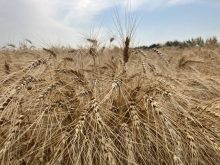Chicago | Reuters — U.S. corn and soybean futures eased on Tuesday as weather forecasts looked less threatening to America’s crops than they had a day earlier, analysts said.
Traders took profits after soybean futures reached a four-month high on Monday on concerns that hot, dry conditions could threaten crop yields in the U.S. Midwest. Rain now appears more likely later this week and next week, according to Commodity Weather Group.
The markets are paying close attention to weather forecasts because corn is entering a critical stage for crop development. Yields are important because the U.S. Department of Agriculture last week estimated that farmers planted fewer acres than analysts expected.
Read Also

U.S. grains: Soybean futures set two-week high on US weather worry, soyoil rally
Chicago Board of Trade soybean futures touched a two-week high on Friday on worries that heat may threaten U.S. crops and expectations that the country’s biofuel policy would boost demand for soyoil, analysts said.
“The weather forecast is not quite as dire as some had thought yesterday,” said Tomm Pfitzenmaier, analyst for Summit Commodity Brokerage in Iowa. Chicago Board of Trade most-active December corn ended down 3-3/4 cents at $3.52-1/2 per bushel (all figures US$). Most-active November soybeans closed down 3-3/4 cents at $9.02-1/2 a bushel.
After Monday’s market close, USDA rated 71 per cent of the U.S. soybean crop as being in good-to-excellent condition, unchanged from the previous week and above analysts’ expectations for 70 per cent. The agency said 71 per cent of U.S. corn was in good-to-excellent shape, compared to 73 per cent last week and 72 per cent expected by analysts.
“The USDA’s crop conditions report said U.S. corn and soybeans are looking reasonable with no reason today for extra concern about crops,” said Matt Ammermann, StoneX commodity risk manager.
Bucking the lower trend in corn and soybeans, most-active CBOT wheat ended two cents higher at $4.95-1/4 per bushel. Some traders were buying wheat and selling corn in spread trades, an analyst said.
France’s farm ministry forecast the French soft wheat harvest would fall nearly 21 per cent this year to 31.3 million tonnes. IKAR, one of Russia’s leading agriculture consultancies, cut its estimate for the Russian wheat crop by 1.5 million tonnes to 78 million tonnes.
— Reporting for Reuters by Tom Polansek in Chicago; additional reporting by Michael Hogan in Hamburg and Colin Packham in Sydney.















